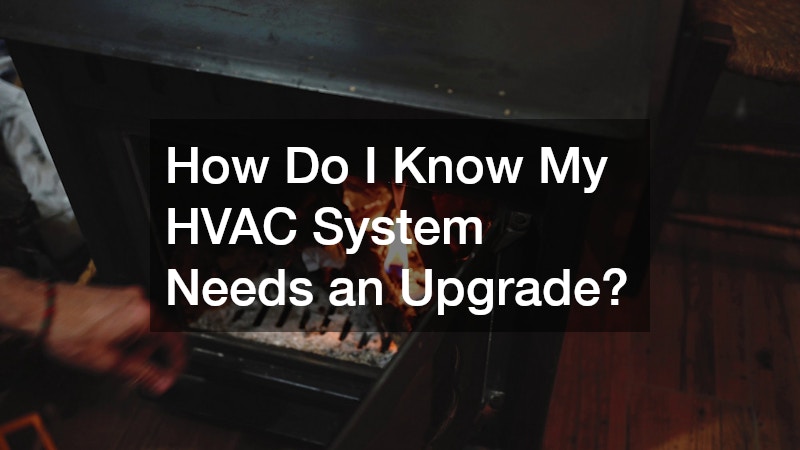
Upgrading your HVAC system is more than just replacing old equipment. It’s an investment in comfort, energy efficiency, and long-term savings for your home. As HVAC technology evolves, older systems can become less efficient, more prone to breakdowns, and inadequate for modern comfort standards. Understanding when and why to upgrade is crucial for homeowners looking to maintain a comfortable indoor environment while managing costs effectively. In this article, we will explore the key considerations, benefits, and processes involved in upgrading your HVAC system, helping you make an informed decision that suits your home and lifestyle.
How Do I Know My HVAC System Needs an Upgrade?

Determining whether your HVAC system requires an upgrade involves more than just observing its age. Several signs indicate that your system may no longer be performing at its best.
Signs of Wear and Tear
Physical signs of wear and tear on your HVAC system are a strong indicator that it may be time for an upgrade. Rust on the unit, unusual noises during operation, and visible cracks in ductwork can all signal that the system is struggling to maintain efficiency. Components like compressors, condensers, and fan motors degrade over time, and continuing to rely on worn-out parts can lead to more frequent and costly repairs, such as furnace repair calls in the middle of winter.
Frequency of Repairs
If your HVAC system requires regular maintenance or repair visits, it may be more cost-effective to upgrade rather than continually investing in repairs. Frequent breakdowns not only inconvenience your household but also suggest that the system is nearing the end of its operational life. Engaging a qualified plumber or electrical contractors can address some issues temporarily, but persistent problems often indicate a need for a full system replacement.
Age of the System
Most HVAC systems are designed to last between 10 and 20 years, depending on usage, maintenance, and model quality. If your system is approaching or has exceeded this range, it may no longer perform efficiently. Aging systems often struggle to meet modern heating and cooling demands, leading homeowners to consider alternative solutions such as mini split systems, heat pumps, or upgraded furnaces that better suit contemporary energy standards.
Rising Energy Bills
A noticeable increase in your energy bills without a corresponding rise in usage is a common sign of an inefficient HVAC system. Aging equipment, whether it runs on propane gas, heating oil, or electricity, consumes more energy to maintain comfort. Upgrading to a newer, energy-efficient system can reduce these costs significantly, offering long-term savings and minimizing your environmental footprint.
Inconsistent Temperatures
If certain rooms in your home are consistently hotter or colder than others, your HVAC system may not be providing even distribution. This could result from an undersized unit, aging ductwork, or failing components. A modern system, such as a heat pump or mini split, can improve airflow and temperature control, ensuring consistent comfort throughout your home. Additionally, regular heating maintenance can help prevent these issues and prolong the life of your equipment.
What are the Benefits of Upgrading?
Upgrading your HVAC system comes with multiple advantages that go beyond immediate comfort. Modern systems provide improved performance, energy savings, and health benefits that older systems often lack.
Improved Energy Efficiency
One of the most significant benefits of a new HVAC system is improved energy efficiency. High-efficiency models are often designed to reduce energy usage whether your home relies on a propane tank, heating oil delivery, or standard electricity. Modern mini split systems and heat pumps offer precise heating and cooling control while consuming far less energy than older models. By lowering energy consumption, homeowners save on utility bills and contribute to environmental conservation.
Better Indoor Air Quality
A new HVAC system can improve indoor air quality by filtering dust, pollen, and other airborne particles. Advanced systems may include UV light purification or high-efficiency filtration to reduce allergens and bacteria. By ensuring cleaner indoor air, homeowners protect their families from respiratory issues while reducing the buildup of contaminants in ductwork. Regular heating maintenance and professional servicing by a local AC company can further optimize air quality.
Enhanced Comfort Levels
Modern HVAC systems deliver faster and more consistent heating and cooling. Heat pumps provide both heating and cooling efficiently, while mini splits offer individualized control for different zones of your home. Upgraded systems maintain proper humidity levels and reduce temperature fluctuations, enhancing comfort year-round. Professional installation ensures that all components, from the furnace to ductwork, operate harmoniously.
Increased Home Value
Installing a new HVAC system increases your home’s market appeal. Buyers often evaluate energy efficiency, reliability, and lifespan of heating and cooling equipment. A system that includes modern technologies, such as a heat pump or mini split, signals long-term savings and convenience, which can make your home more competitive. A propane tank or heating oil delivery option may also appeal to specific buyers looking for alternate energy solutions.
Environmental Impact
Older HVAC systems typically consume more energy and may rely on refrigerants that harm the environment. Upgrading to energy-efficient systems reduces greenhouse gas emissions. Choosing a heat pump or mini split reduces reliance on fossil fuels, while implementing propane gas systems responsibly can offer lower emissions compared to traditional heating oil delivery methods. Conscious homeowners can adopt sustainable energy practices without compromising comfort.
What are the Costs Involved in Upgrading?

While a new HVAC system can be a significant investment, understanding the costs helps homeowners plan effectively.
Initial Purchase Cost
The price of a new system varies depending on size, type, and technology. A standard central air system or furnace may cost less upfront, while high-efficiency heat pumps, mini split systems, and advanced units designed for larger homes carry a higher initial cost. Investing in a quality system reduces the likelihood of frequent repairs and extends operational life.
Installation Expenses
Professional installation ensures the system functions safely and efficiently. Electrical contractors and HVAC specialists coordinate to integrate wiring, ductwork, and components. Installation may include connecting propane tanks or configuring mini split units, depending on the chosen system. While installation increases initial expenses, professional service reduces the risk of costly mistakes.
Long-term Savings on Energy Bills
New HVAC systems, particularly energy-efficient heat pumps or modern mini splits, significantly lower monthly utility bills. Over time, the savings can offset the upfront costs, making an upgrade a financially sound decision. Systems using propane gas or heating oil delivery can also be optimized for cost-effectiveness through proper usage and maintenance.
Maintenance Costs
Routine maintenance, such as heating maintenance checks, filter replacements, and duct cleaning, keeps your system operating efficiently. While maintenance incurs minor ongoing costs, it prevents expensive repairs and prolongs system life. Many homeowners establish service agreements with a local AC company or HVAC contractor to streamline upkeep.
Warranty and Financing Options
Most modern HVAC systems come with manufacturer warranties covering parts and labor. Some contractors offer extended coverage or maintenance packages, providing peace of mind. Financing options make high-efficiency systems like heat pumps and mini splits more accessible to homeowners, spreading costs over time without compromising quality.
What Types of HVAC Systems Should I Consider?
Homeowners have more options than ever for heating and cooling, with systems designed for efficiency, comfort, and environmental responsibility.
Central Air Conditioners
Central air remains a popular choice for uniform cooling throughout a home. When paired with a furnace, it provides complete year-round comfort. Modern central systems are more energy-efficient than older units and can be integrated with smart thermostats for precise control.
Heat Pumps
Heat pumps offer dual heating and cooling functions, making them versatile and energy-efficient. Ideal for moderate climates, heat pumps reduce the need for separate heating systems while maintaining consistent indoor temperatures. Heat pumps can also be paired with propane gas or heating oil delivery options for hybrid solutions in colder regions.
Solar HVAC Systems
Solar-powered HVAC systems harness renewable energy to provide heating and cooling, reducing reliance on traditional energy sources. Though upfront costs are higher, solar systems provide long-term energy savings and reduce environmental impact.
Geothermal Heating and Cooling
Geothermal systems use the stable temperature of the ground to heat and cool homes efficiently. These systems have higher initial installation costs but provide unparalleled efficiency and low operating expenses over time. They also reduce carbon footprints compared to conventional propane or oil-based systems.
Mini Splits
Mini split systems are ductless and allow for precise control of individual zones within the home. They are highly energy-efficient and ideal for homes without existing ductwork. Installation flexibility and modern design make mini splits a popular choice for both retrofits and new construction.
Smart and Programmable Thermostats
Smart thermostats optimize system performance and energy usage. They adapt to occupancy patterns, monitor indoor conditions, and can be controlled remotely via apps. Paired with any HVAC system, these devices enhance comfort and reduce energy costs.
How Do I Choose the Right HVAC System for My Home?
Selecting the right system requires careful consideration of home size, climate, and personal preferences.
Assessing Home Size and Layout
The size and layout of your home determine the type and capacity of the HVAC system needed. A larger home may benefit from multiple zones using mini splits or a high-capacity heat pump, while smaller homes may operate efficiently with a central air system and furnace combination.
Climate Considerations
Climate plays a critical role in system selection. Homes in colder regions may rely on propane gas or heating oil delivery for supplemental heating, while temperate climates may perform well with a heat pump. Understanding your local weather patterns ensures your system meets year-round needs.
Energy Efficiency Ratings
Energy efficiency ratings, such as SEER for cooling and HSPF for heating, indicate system performance. Higher ratings typically translate to lower operating costs. Combining efficiency ratings with proper installation and heating maintenance maximizes savings.
Consulting with HVAC Professionals
A qualified HVAC professional or local AC company can assess your home and recommend the best system. They consider factors like electrical setup, existing ductwork, and energy requirements. Consulting experts helps prevent issues like undersized systems or improper installation.
Budget Considerations
Cost is a significant factor when choosing an HVAC system. Balancing upfront investment with long-term energy savings ensures you select a system that meets needs without overextending your budget. Financing options, warranties, and maintenance packages can help manage expenses effectively.
What Should I Expect During the Installation Process?

Proper installation is key to a system’s efficiency and longevity. Understanding the process can help homeowners prepare.
Pre-Installation Home Assessment
Professionals assess your home’s layout, insulation, ductwork, and energy demands before installation. This evaluation ensures the system, whether a heat pump, mini split, or central air unit, is correctly sized and configured for optimal performance.
Timeline and Disruptions
Installation timelines vary by system type. Central air or geothermal systems may require more extensive work, while mini splits can often be installed more quickly with minimal disruption. Planning ahead helps manage household schedules during installation.
Choosing the Right Contractor
Selecting experienced electrical contractors or a reputable local AC company ensures proper installation. Verify certifications, insurance, and references before committing to service. Skilled technicians prevent common pitfalls such as incorrect wiring or improper refrigerant charging.
Permits and Regulations
Some systems, including propane gas connections or high-capacity heat pumps, require permits and adherence to local building codes. Professionals manage these requirements to ensure compliance and safety.
Post-Installation Checklist
After installation, homeowners should verify system functionality, thermostat programming, and airflow throughout the home. Scheduling initial heating maintenance and checking for leaks or unusual noises ensures long-term performance.
How Do I Maintain My New HVAC System?
Ongoing maintenance protects your investment and ensures efficiency.
Regular Filter Changes
Filters should be replaced every one to three months, depending on system type and usage. Proper filtration reduces dust, allergens, and strain on the system.
Seasonal Check-ups
Routine heating maintenance and cooling inspections help identify potential issues before they become costly repairs. Scheduling seasonal check-ups with a local AC company or HVAC technician extends system life.
Smart Thermostat Adjustments
Programmable thermostats should be updated to reflect seasonal needs. Adjusting temperature settings reduces energy consumption while maintaining comfort.
Duct and Vent Cleaning
Clean ducts and vents improve airflow and indoor air quality. Professional cleaning ensures debris, dust, and mold do not compromise system performance.
Manufacturer’s Guidelines
Following manufacturer instructions for maintenance, component replacement, and operational best practices protects warranties and ensures optimal performance.
What are the Latest Innovations in HVAC Technology?

HVAC technology continues to evolve, offering improved efficiency, convenience, and health benefits.
Energy Star Certified Models
Energy Star certified units meet strict efficiency standards, lowering energy bills and reducing environmental impact. Both heat pumps and mini splits often carry this certification.
Internet of Things (IoT) Capabilities
Modern systems can connect to smart home devices for remote monitoring, control, and energy optimization. IoT integration allows homeowners to receive alerts, track usage, and fine-tune settings.
Hybrid HVAC Systems
Hybrid systems combine multiple energy sources, such as propane gas and electricity, to provide efficient heating. These systems automatically select the most cost-effective mode based on demand and climate.
UV Light Air Purification
UV light systems installed in ductwork reduce bacteria, mold, and allergens. This technology improves indoor air quality while protecting sensitive components of your HVAC system.
Variable Refrigerant Flow (VRF) Systems
VRF systems allow precise control of heating and cooling in multiple zones. They adjust refrigerant flow based on demand, providing energy savings and comfort customization.
How Can I Improve My Current HVAC System Without Upgrading?
Even without a full system replacement, homeowners can optimize performance through several strategies.
Sealing and Insulating Ductwork
Properly sealed and insulated ducts prevent energy loss and improve system efficiency. This is particularly important for older homes with extensive duct networks.
Thermostat Adjustments and Zoning
Zoning and smart thermostat usage can regulate temperatures in individual areas, reducing energy consumption and improving comfort.
Improving Home Insulation
Well-insulated homes retain heat in winter and stay cool in summer, reducing HVAC workload. Adding insulation complements heating and cooling systems, whether running on propane gas or electricity.
Energy Audits
Professional energy audits identify inefficiencies and opportunities for cost savings. Recommendations may include duct sealing, insulation upgrades, or mini split additions.
Complementary Cooling and Heating Solutions
Supplemental systems like mini splits, space heaters, or ceiling fans can reduce strain on the primary HVAC system. Using these strategically lowers energy bills and extends system life.
What Are Common Mistakes to Avoid When Upgrading HVAC Systems?
Avoiding common pitfalls ensures your investment delivers long-term satisfaction.
Underestimating System Size Requirements
An undersized system struggles to maintain comfort, while an oversized system wastes energy. Professional assessment ensures proper sizing based on home layout and energy needs.
Neglecting Efficiency Over Cost
Choosing the cheapest system may result in higher operating costs. Prioritizing efficiency saves money over the system’s lifespan and reduces environmental impact.
DIY Installation Pitfalls
Improper installation can lead to inefficiency, damage, and voided warranties. Working with experienced electrical contractors or a local AC company ensures professional installation.
Ignoring Regular Maintenance
Skipping heating maintenance, duct cleaning, or filter changes shortens system lifespan. Scheduled upkeep preserves efficiency and prevents costly repairs, such as frequent furnace repair calls.
Overlooking Warranty Details
Understanding warranty coverage protects homeowners from unexpected costs. Verify what is included, duration, and requirements for service to avoid surprises.
Final Thoughts
Upgrading your HVAC system can substantially improve your home’s comfort, efficiency, and value. By recognizing the signs of necessary upgrades, exploring energy-efficient solutions such as heat pumps or mini splits, and working with qualified professionals, including plumbers and electrical contractors, homeowners can achieve a healthier, more comfortable indoor environment. Proper planning, installation, and ongoing heating maintenance ensure your system provides reliable performance for years to come. Whether using propane gas, heating oil delivery, or electricity, a modern HVAC system is a critical investment in your home’s future.



